Uzbekistan
Our exit from Turkmenistan was considerably less gruelling and time-consuming than our entrance, only the "jobs worth" squaddie on the barrier insisted on his superior (who was obviously on the khasi) examining the passports after everyone else, making us wait in the 40C scorching sun.ROUTE: Uzbekistan
DISTANCE DRIVEN IN COUNTRY: 843 miles/ 1,349 km
DISTANCE FROM HOME: 7,340 miles/ 11,744km
WEEKS COMPLETED: 11/74
Okay, okay its been some time since we last updated you but the last few weeks have been eventful to say the least, which of course should make for good reading. Before I start on my review of Uzbekistan, thanks to all of you who have sent us words of support/sympathy for our efforts. It really is a lifesaver to know that we are not "alone" out here. Now lets see if I can live up to Simons standards
First, just a couple of additional anecdotes from the previous countries that Id like to share with you.
Georgia you may recall that the overall impression of that country might be summed up by "Youll literally be dying to go to Georgia". Well, our usual preparations of reading the Lonely Planet guidebook beforehand, highlighted a village that we might like to take in, Nokalakebi meaning "a city used to be here", though it still does have a medieval stone lavatory which "is well worth a visit". Quite wisely however we chose to avoid it after realising that the whole country "used to be here".
Azerbaijan as well as the "famous" oil and gas exhibition that the port of Baku holds each year, we were unfortunate to miss Azerbaijans first international tourism fair when the world tourism chairman officially announced to Azerbaijan that it has everything needed for tourism except tourists! Bugger.
World Cup hype and coverage has varied from country to country. Azerbaijan TV was keen to buy all the visual output but none of the sound. But hey you cant show a match without any crowd noise, so what do they do but overlay a sound recording of a previous England match from start to finish you can faintly hear the crowd chant "One nil to the Engerland, one nil ..."! And this is the same for all matches in the tournament.
UZBEKISTAN
IMPRESSIONS ...
Fat-arsed sheep
Traditional wedding Ill send you a description of this separately
"Double bed" tables
Young boys messing around naked in irrigation canals, five minutes later their sisters draw the same water for drinking
Squatting and spitting
Gold teeth
Samsas (lamb and onion pasties) and potato doughnuts
Yellow carrots
Market pram boys (barrow boys)
Police station no 2
Did I mention fat-arsed sheep?
TRAVELOGUE ...
Our exit from Turkmenistan was considerably less grueling and time-consuming than our entrance, except for a jobs worth squaddie who insisted we wait in the scorching sun while his superior returned from the toilet. Into a kilometre of no-mans land as we psyched ourselves up for the next battle; our guidebook warning us of dodgy Uzbek officials. As usual, we could not have been more surprised. No extortion or taxes from the Kalashnikov wielding guards, just a friendly passage throughout. They didnt even want to sell us any bike insurance, and when we asked to buy it they advised that it was worthless anyway!
As soon as we crossed the border I was struck by the difference in attitude towards farming. Here we found another Turkish style country where every inch of land was put to good use. Golden wheat (in the course of being harvested) had been planted in every conceivable nook and cranny, even under the trees in bursting fruit orchards.
After the collapse of the USSR each country had the opportunity to rebuild its identity. Uzbekistan decided that its hero would be Timur, the 14th century Emir of Samarkand who might be described as a cultured version of Ghengis Khan. He spent years rampaging about the neighbouring lands, slaughtering hundreds of thousands of innocent people, plundering their riches, capturing their artisans and putting them to work on the great buildings that still exist today. Statues of the tyrants tyrant have now replaced virtually all the figures of Lenin. We thought that his grandson, Ulughbek, would have been a better choice for a hero, as he was much more of an intellectual and a brilliant astronomer, but the Uzbeks like a hero with a good dose of blood and gore.
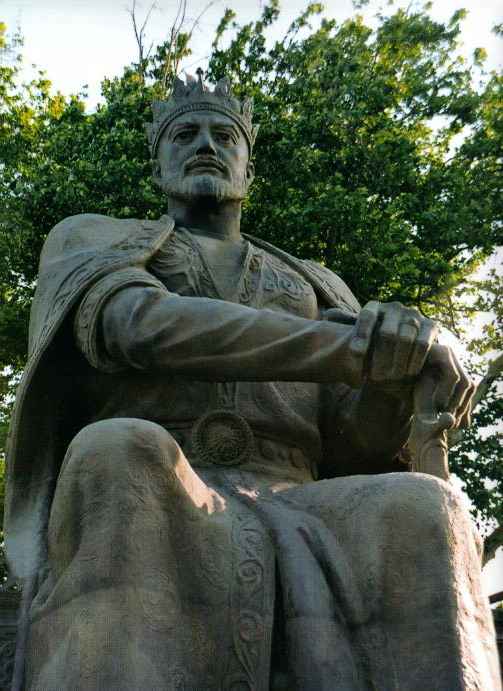
Timur - the tyrant's tyrant
Our first port of call was Bukhara, a city crammed full of historical buildings; mostly mosques, medressas and minarets. Our guidebook suggested that the hotels would be grotty (no news there then) and the private hotels (offering bed and breakfast) would be quite expensive for our budget. However, as we chugged around the old city a cocky young 12 year old girl ran over and asked if we were looking for a hotel. Tentatively we said yes and I was dragged off to her home to inspect. Through a wooden gate, that looked like a builders yard on a council estate, lay a family house where the best room was rented out to tourists. It was all done unofficial, to avoid tax. Our room was a large 300-year-old reception hall with carved wooden beams holding up the ceiling, mosque-like tiling and carved plaster on the walls. Sleeping arrangements were typical for the county; padded quilts on the carpeted floor. At $7 each, including a respectable breakfast, we couldn't complain and made this our base for 4 nights.
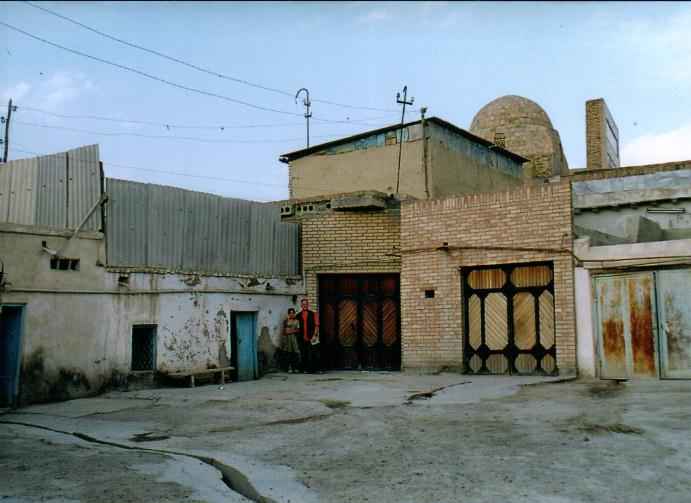
Doesn't look much, but it was lovely inside
Staying here among a family provided us an insight into Central Asian life. The first lesson that we learnt was that just because you live in Uzbekistan doesnt necessarily make you an Uzbek. This family were proud to be ethnic Tajiks, historically Persians and so related to present-day Iranians. Centuries of migration and Stalins more recent divide and rule policy of redrawing national borders has meant that a large proportion of Uzbek, Kazak, Kyrgyz, Tajik and Turkmen people dont actually live in those respective countries.
The home contained two families and was typically female dominated, with the men away in Moscow on biznez for months on end. This left the women running the household. Our hostess seemed to have countless sisters who visited with all their offspring. Since the summer weather makes indoor living so oppressive, all entertaining is performed outside in the shaded courtyard. The sweltering days are spent lazing around on raised wooden bed-like structures covered with single quilts, sipping a bowl of tea or snoozing. All outside cafes uses the same furniture, sometimes with small coffee tables on top on which to put your food. As you might imagine theyre not the most comfortable sitting arrangement for a Westerner, but wed love to build one when we get back home!
Whilst I was reclining in the courtyard, the family went into absolute ecstasy over my feet. I was asked to take off my sandals so that they could examine my feet and calves, which they declared to be "SOOO beautiful". A small (UK size 4, European 36), chubby foot (complete with scabs from mosquito bites and burnt skin) is apparently an object of great beauty in this part of the world, as are thick calf muscles and thunder thighs! Every time a friend visited, my thighs would be grabbed and discussed in Tajik. Simon even got give the nod for choosing a goodun. So Mum, at last I can say thanks very much. Of course the cynic in Simon believes they like the broad foot shape because it resembles that of a camel (spreads the load) and when they groped my thighs, they were only sizing me up for the pot.
The whole houses water needs came from one tap located in the courtyard. The oldest boys single chore was to fill up buckets and an oil drum, the contents of which would be used for every conceivable purpose, including flushing the newly concreted hole-in-the-ground toilet, and bathing in their equally new hamam. I suppose I ought to mention loo paper whilst we are on the subject; its a highly sought after commodity, yet rarely used. Trying to find soft loo roll in most of these countries has been a major task and spanned several shopping trips. You can easily obtain a roll of recycled newsprint in a papier mache style for a few cents, but neither of us could get used to that. More commonly though the locals didnt bother spending any money but cut up their childrens school notebooks instead. On various occasions I marveled at their maths homework whilst squatting. Apparently this state of affairs is not recent; Simon tells me that British SAS troops had been known to rummage around Soviet army toilets after Cold War exercises in order to steal secret documents that the personnel had been forced to recycle because they hadnt been provided with any with loo paper!
Bukhara is full of fantastically preserved architecture. The mosques and medressas (Islamic colleges set around a cloistered central courtyard) are all ornately tiled with deep greens and blues and would be magically spiritual if it were not for the hundreds of souvenir shops inside them all vying for your business. The sad thing is that there were only a handful of tourists in the city during our stay; September 11th had really affected them.
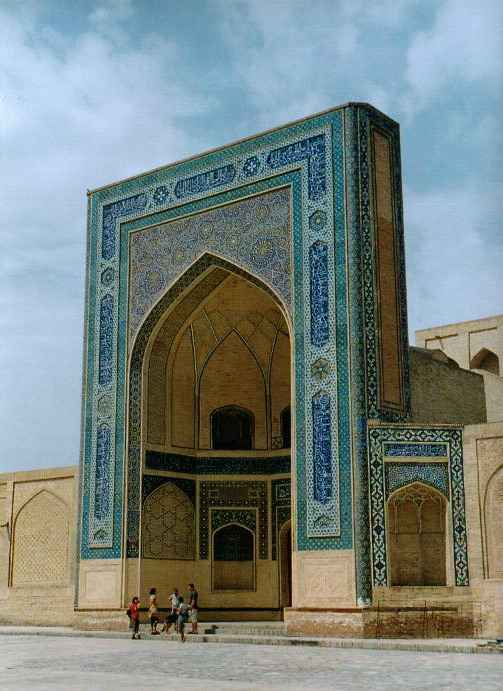
A medressa
Leaving the monuments aside for a while, Bukhara will be etched on our memory for two very human reasons. The first started on our first full day in Uzbekistan I busied myself with getting money, a monumental task in itself. On my return Simon was nowhere to be found. Eventually someone explained he had left the house with his camera in search of the origin of some lively music, probably a wedding. Half an hour later a rather sweaty, giggly Simon reappeared.
"I've just been dancing with some professional dancers, the men made me drink vodka, and we've been invited to the wedding reception tomorrow night".
He had found the music emanating from a courtyard in back-street house and had been pulled in by the wedding party who were only too happy to have a westerner photograph the festivities. And the Uzbek men, like men everywhere, were keen to see what a stupid foreigner would do under the influence of vodka! Simon couldnt refuse to drink or to dance. It appeared that he was required to tip the dancing women, so a 200 Sum note (worth about $0.20) was shoved in his hand to give them. Rather embarrassed, he scratched around in his pocket to look for his own money. Since I pull the purse strings on this trip, all he had was a $5 note that was supposed to be used to register us with the police. He handed this over to the dancers great delight, but was severely reprimanded by the wedding hostess for giving far too much!
Anyway the next evening we dolled ourselves up in our least grotty clothes and headed off to the home for our 6pm rendezvous. Surprisingly Simon managed to find it again, his memory not fully erased by the vodka. We were invited in and conversed in our usual stilted Russian. Tonight's festivities were to be held in the groom's family's residence (we never fully understood what relation the bride and groom were to our hosts). We took a 45-minute stroll to the other side of the city and ended up at what looked like a street party. A dozen tables laid out with nibbles and soft drinks; perhaps this would be an alcohol free event!
We sat down and made polite conversation as more people that Simon vaguely remembered from the previous day turned up. Men smiling with mouthfuls of gold teethed proudly waved to the westerner that they managed to get drunk.
Eventually the bride and groom arrived, shaded by a large embroidered cloth carried above their heads. As they walked past each table the bride, in a typically western, white meringue dress held her left hand to her cleavage and bowed in reverence to us. We were told that this is the sign of respect. A little unusual and unnerving, we accepted it as a one-off. However, it was NOT a one-off: for the next four hours the bride and groom remained STANDING at their table, with the bride regularly bowing to the guests!
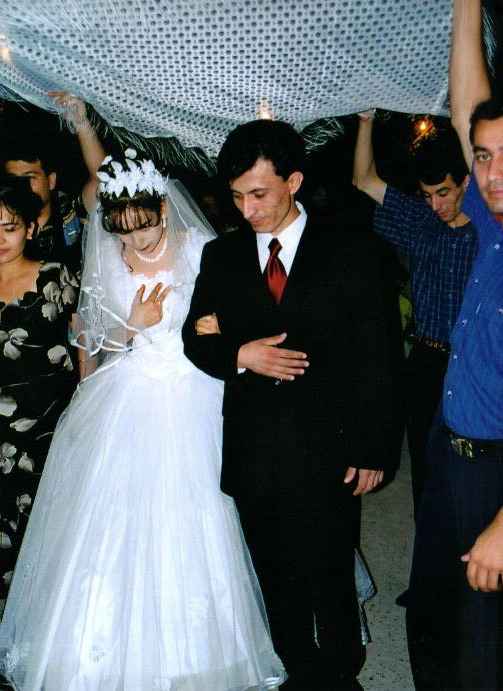
Honouring the guests
And then the vodka was delivered in crates full half litre bottles. Strangely, the tradition is to drink vodka from bowls that we would recognise as tea cups in Chinese restaurants. Our male host poured and I wait to be passed a cup. No, no, no! First he had to attract Simon's attention (temporarily diverted by the arrival of the two professional dancing girls) to ask his permission for me to drink! Simon gives a quiet nod and I could join in the toasts.
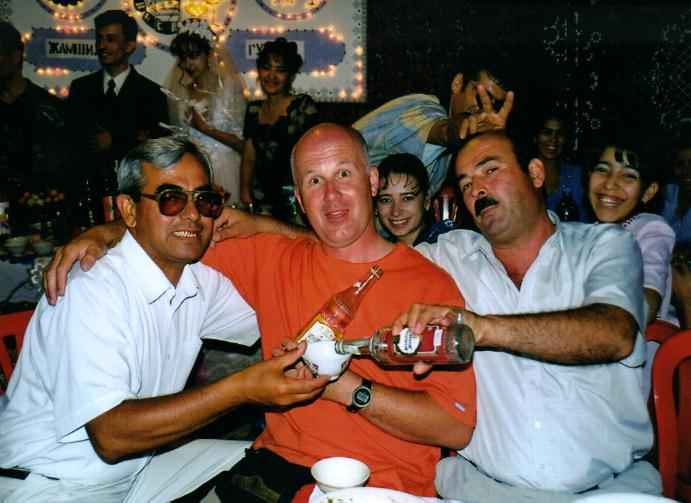
Vodka
Now back to those dancing girls. What a sparkle in their eyes when they recognised Simon again. More dollars they thought, but our hostess distinctly ordered Simon not to give any more hand outs. They did a few traditional dances to the live band and then anyone could dance with them for a small consideration. The Uzbek dance style requires the arms and hands at shoulder level or above, and since the bank notes are so huge and colourful it's obvious when you want to pay. Until the music stopped the professionals prancing around with increasingly large wads of money in their right fists.
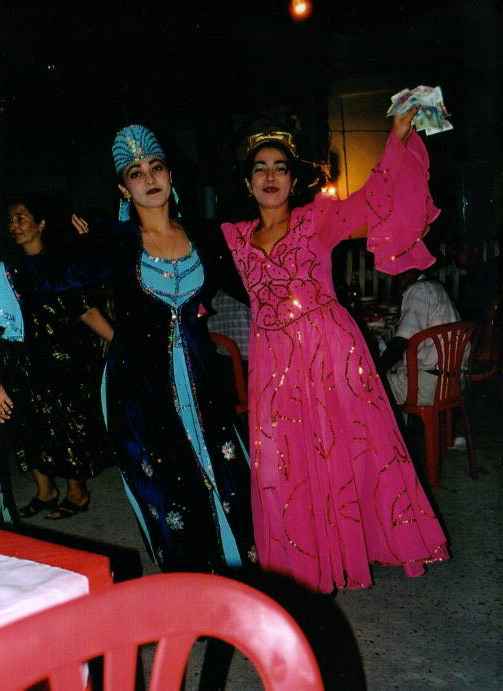
The Professionals
As the vodka kicked in we all danced more and more. And even I got money shoved in my hand! I made the grand total of 700 sum that night - $0.65. Im your private dancer, a dancer for money.......
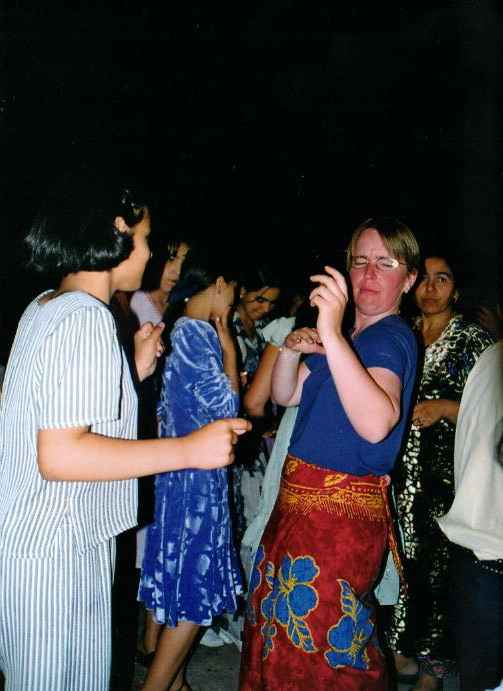
The Amateurs
During the dancing the guests gradually made their way to the bride and groom's table to present their gifts. Carpets are traditional, but obviously we didn't have time to buy one, so we gave a donation of $20 in a 'sealed envelope'. Simon had worked out the protocol; he popped the envelope the groom's pocket, and stood aside as the best man removed the envelope and passed it behind a curtain. We drank a toast with them then sat back down. The whole process cant have taken three minutes, but by the time we returned to our table, our hostess was ready to thank us for the $20 gift. That has to be one of the fastest grapevines ever!
At about 1am the happy couple was finally invited to the dance floor for their first dance. They stayed for a few more tunes then it was time to go. An old woman followed them into the marital home with some burning coals and the party was over. But as we made our way out, our hostess stopped and asked Simon to wait for 20 minutes as there was a little bit more tradition to be done.
As Simon waited outside I was taken inside to a small room and invited to sit down against the wall as about 8 women entered. In a ragged pile on the floor were loads of decorated padded quilts, pillows and throws. In the far corner, very carefully, my hostess and a couple of other women started laying out the quilts on top of each other. There were great discussions on what order to place them in and on picking the correct ones. Finally it dawned on me what I am being privileged to watch. I witnessed them literally building the matrimonial bed! I am still stunned that they have allowed me in.
A double bed was created about 40cm high. Beside it was a lower single sized bed topped with a pure white sheet; this was the first bed they would be required to sleep on. When everything was finished two middle-aged ladies stood up, embraced, and then launched themselves onto the big bed; I presume these to be the respective mothers, testing the bed. This act was accompanied by cheers from everyone.
Next the bride entered the room, now dressed in red, her face covered by a veil and she sat on the small bed. With our hands cupped the most elderly women burst forth with a blessing to which we all agree. And then we left the room ...
I returned to Simon, gobsmacked at what I had been allowed to see. For once I didn't have the camera with me which made it more special because all I have now are memories.
We staggered back to our 'hotel' in the pitch dark with Simon escorting all the young pubescent daughters, desperate to hold his arm. I carried on talking to our hostess, our conversation is occasionally interrupted by the conversation that went on all night between the host and Simon ...
Host (shouting): Simon!
Simon (shouting): Shto? (what?)
Host: Vodka! (accompanied by the vodka hand signal of a thumb pointing to the throat)
Simon: Nyet! (No!)
We arrived back at 2.30, spent 5 minutes trying to awake the dead inside to open up the door, and then stumbled into 'bed' very contented. We cant wait for our first Mongolian wedding invite accompanied by the fermented mare's milk.
So that was a pretty special way to remember Bukhara, but the next day I topped it; but youll have to look at the postscript at the end of this chapter to find out how....
Our next city to visit was Samarkand. En route we stopped at a non-descript cafe for lunch where we started talking to customers on another table. Our conversations in general are obviously very rudimentary unless the locals can complement their indistinguishable mutterings with sign language or drawings. A typical greeting is the following:
Them: Atkuda? ("Where are you from?")
Us: Anglia (England)
Them: Atkuda? (This time it means "Where are you going?" Weve been told that it should sound like Akud edyeh, were hard pushed to spot the subtle difference in pronunciation.)
Us: "Japoniya (Japan)
Them: Shkolka dyeti? (How many children do you have?)
Theres an assumption that we are married, and we always pretend we are because it is socially acceptable. Occasionally Simon is asked how many wives he has, since bigamy is legal in some of these countries assuming the man has sufficient funds to keep multiple families. The children question was interesting. Initially I wanted to say "Weve got three; one in each pannier and another in the tank bag", because I thought it such a silly question having told them we are away for 18 months. But then I realised that were not spring chickens and actually we could have married and had children at the age of 17 (like the local women do) and brought them up already. Everyone we spoke to was upset that we didnt have kids, but perked up when we promised to make babies on our return to England.
Back to our cafe neighbours who were over the moon when we revealed we were from England and even more so from Manchester. The entire Manchester United squad was reeled off to us and they swore their belief that the England tea would win the World Cup (still possible at that time having just beaten Denmark). The vodka bottle came out and we were forced into several toasts. Seeing their unquestionable passion for English footie we presented them with the usual Man Utd pencil. Oh the joy. The next 10 minutes we watched the four of them discussing how to divide it up fairly: the final decision being that they would cut it up! In exchange for the 35c pencil, one of them a farmer, suggested he slaughtered a sheep and make shashlik (kebabs) "as long as your arm". We courteously declined.
Samarkand, ubiquitous with the Silk Road, is another mosque and medressa filled city. One evening we embarked upon our first musical and cultural experience, an open-air concert in the courtyard of the Registans medressa. We were slightly confused when asked what time we wanted the performance to start, then twigged that we were the ONLY paying spectators. Slightly deterred we took our seats on the bed table and watched a 50 minute musical about a wedding and then got invited to dance on stage. At least we knew what to do from our previous real wedding.
On the outskirts of Samarkand theres an observatory, built by Ulughbek in the 1420s. A guide at the site told us of Ulughbeks great intellectual prowess and pointed out documents that stated that the observatory had been placed at exactly 67 degrees east and 39 north. We didnt point out that the Greenwich meridian was established several centuries later!
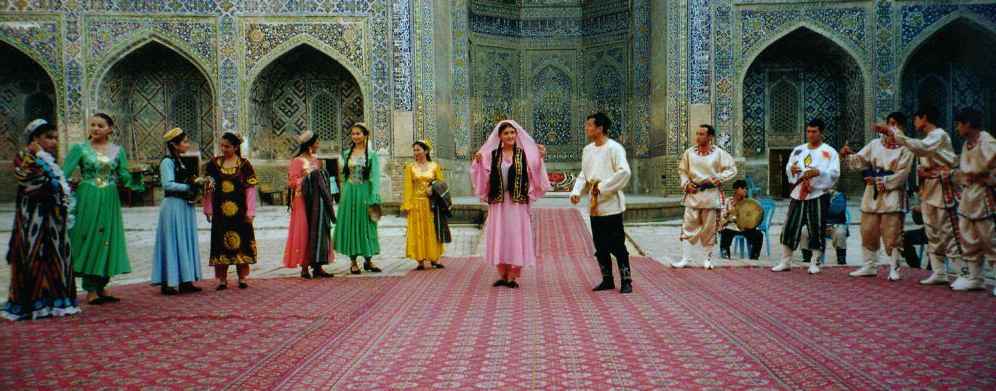
The show
England got booted out of the World Cup.
The final city to visit was Tashkent. Instead of taking the obvious straight route we decided to take a ride into the hills near the Tajikistan border, rough camp for the night, then head for the capital. Uzbekistan had been such a scorcher it had been impossible to camp out, so we were hoping that in the hills it would be cooler. Oh dear, the best laid plans. Only 20 minutes into the trip Simon stopped the bike and asked me to check the tyres because hed just ridden over some metal. I couldnt see anything so we continued. An hour or so later, having eaten some samsas (meat pasties, cooked by sticking them to the inside walls of a mud oven) we discovered a rear puncture. Simons brain must have been working overtime because he suddenly remembered the Russian word for tyre repair shop. As luck would have it there was one 50m away. After one bodged attempt the puncture was fixed, the cause was an invisible 2cm of metal wire. Spurred on by the success we continued on our way for the hills. How we smiled as we saw disks of cow shit drying out in the sun. We grinned even more when we espied the young girls harvesting them from the grazing fields!
Road signs in these countries are virtually non-existent even for major towns, if you do spot one its rusted and illegible. So we were relying on the GPS and a rather large-scaled map of Central Asia. We knew what town we wanted to aim for in the hills, most of the time we could make educated guesses, but theres always someone hanging around to ask if in doubt. Its often not worth asking policemen who would usually respond "Oh I dont know, I only do traffic". So when we saw a policeman in one village, apparently waving us to slow down we waved back, slowed down a bit and carried on. Three kilometres km out of town he chased us down in his Lada oops! We tried our usual pleasantries but he just demanded our passports and "karta" map, distinctly indicating that we would not be going any further. Simon showed him our standard map, since we had learnt how that usually brings a look of awe to most men, but that wasnt good enough. We were to follow him back to the police station. Oh well, something else for the newsletter I thought.
I stayed outside the police station with the bike whilst a drunken looking police officer burbled and slurred to me. It turned out he wasnt intoxicated from alcohol but from nasvai, a nasty finely crushed tobacco, mixed with spices, ash or lime and perhaps opium. Apparently you take a pinch and place it under the tongue or inside your cheek. It makes you produce loads of saliva, hence the hocking and spitting that accompanies it. He offers me some and I refuse.
Meanwhile Simon was having the book thrown at him. We had wandered too near to the Tajik border and the officer thought we should be travelling with an official map indicating an allowed route, similar to that in Turkmenbashiland. Because of our circuitous route we missed the police checkpoint that would have turned us back. He joked that we would have to spend the night in jail, so Simon asked to phone the British Embassy, and he immediately retracted his joke. We know that the official karta was no longer required but it took him quite a few phone calls to get it confirmed. Once this was established he had to organise a police escort to make sure we left the area. However all available personnel were watching (or maybe marshalling) a big non-FIFA football match. He told us that wed have to stay the night at his place along with wife and 3 kids! In the mean time we are fed a supper of tinned sardines and stale bread; mmm Simons favourite.
Four hours after the start of the incident we are called out to the bike and the officer asked for the Russian dictionary; a book that no-one so far had known how to use. He found and pointed to a word and Simon who read out "apology". With this our passports are handed back. Asking no questions we togged up and left unescorted, completed amazed a police officer has apologised to us. His orders to us were to head straight back to the main Samarkand to Tashkent road, however at 8pm it was now getting dark and we always avoid riding in the dark for many obvious reasons. We both agree the best option was to rough camp as soon as we couldnt be seen. Turning off the lights, we took a small track off the road and set up camp in a wheat field behind a creaking combine harvester. Needless to say our nights sleep was restless.
At dawn the next morning we struck camp and nervously headed for the police checkpoint that would undoubtedly be waiting for us, the police officer surely having radioed ahead. Slowing down, we raised our visors, smiled, waved and observing no request to stop, sailed through. Phew, close shave! We giggled together as we imagined the conversation after we passed: Eerrrr? They were foreign! Where did they come from? Eerrr; shouldnt we have stopped them?
We stopped for a well-deserved breakfast at a cafe. Since there is almost never a menu our technique is to ask to see the kitchen to choose our meal. We ordered shorpa, a mutton stock with vegetables and meat. The mutton tends to come from the fat-arsed sheep, an extremely bizarre ovine creature; it grows an enormous deposit of fat under its tail. These two fat buttocks can grow to the size of a football, and wobbles comically as the sheep walks. Even stranger is that the fat is considered a delicacy, attracting a higher price than the meat. A bowl of shorpa though must be consumed quickly since the melted fat starts to congeal rather sharply, leaving a film of grease in your mouth and lips. We also tend to leave the chunks of fat floating around the top, much to the amazement of the staff.
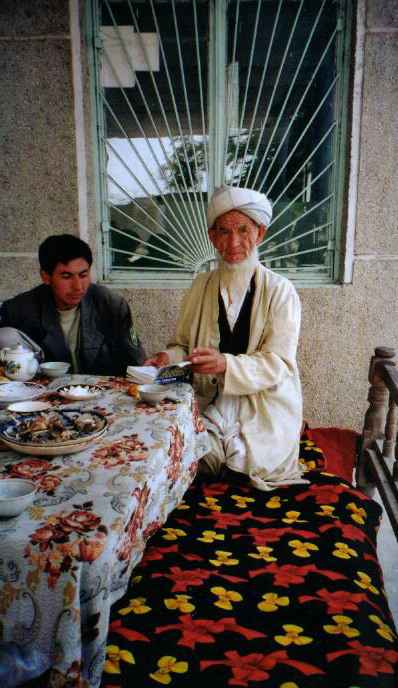
Whitebeard on the road to Tashkent
Into the capital city of Tashkent, a rather ugly Soviet concrete jungle, we headed straight for the recommended cheapest hotel. Unfortunately it is state run and when we arrived it was lunch-time, so reception was closed and we were told to come back an hour later. What service?! Simon meanwhile has been befriended by a group of Indian businessmen who revealed that their company has just bought the hotel. Knowing the state of our chosen hotel, they suggested we stay in one of their recently refurbished hotels on the other side of town. Since its the same price we couldnt refuse. We were in fact the first guests staying in the room, so nothing worked, but at least it was very clean and comfortable. And we will probably also be the last tourists for some time since we were evicted the next morning when the manager finally owned up to not being registered for tourists. We were asked to leave without paying and promising not to tell anyone. So it was back to our original hotel for a delightful 5 days of a non-flushing toilet, intermittent hot water, LOUD music from restaurant below and the joy of cockroaches.
Good museums are few and far between in this neck of the woods. However Tashkent managed to offer one for the girls (Fine Arts) and one for the boys (Railway). The latter was a bargain at 10c entrance fee and allowed us to clamber over the engines. The curator was a curious guy who was fascinated by our trip. Having asked the distance we would be travelling and the fuel economy of the bike he proudly announced that we would be using 3 tonnes of fuel; only a railway man would calculate it in such a way!
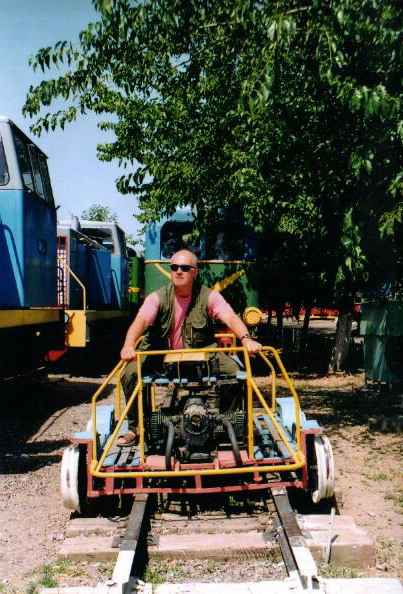
Simon finds another flat twin to ride
After two weeks in the country we broke for the border with Kyrgyzstan in search of the cool mountains. Here we passed through the Fergana Valley, an area reported by our Foreign and Commonwealth Office to be full of bandits. Apart from a lengthy military checkpoint as we approached the region, mostly caused by soldiers wanting to take photos of the bike, we had no difficulties whatsoever.
And so into Kyrgyzstan, the land that Hellmanns mayonnaise gets transported to; but thats a story for Simon to tell...
Postscript
The second memorable event in Bukhara happened when I proposed to Simon! Simon had proposed to me the previous autumn, and I had turned him down because...... Now it was my turn and a restaurant be the side of a 300 year old ornamental pool seemed like the perfect setting. Of course Simon couldnt and didnt refuse my offer. And now wed be able to pretend to be man and wife with a little more conviction.
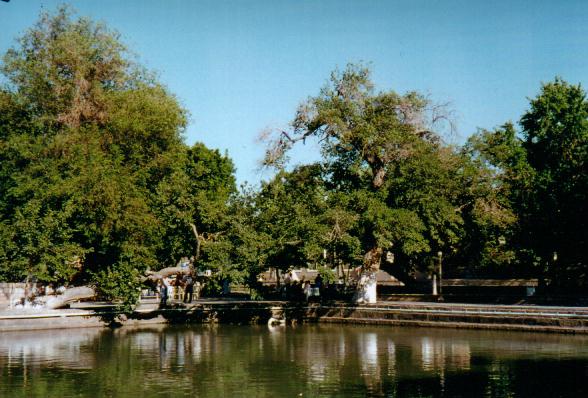
Where Georgie proposed to Simon
Theres a good reason for putting this important news in the postscript. We couldnt easily tell our families about the engagement. The telephone systems in Uzbekistan were poor and expensive, sending such news in an email would have been all wrong, and we wanted a bit of ceremony to go with the announcement. So we sat on the news until Christmas, when we sent letters to our respective parents to be opened on Christmas Eve.
